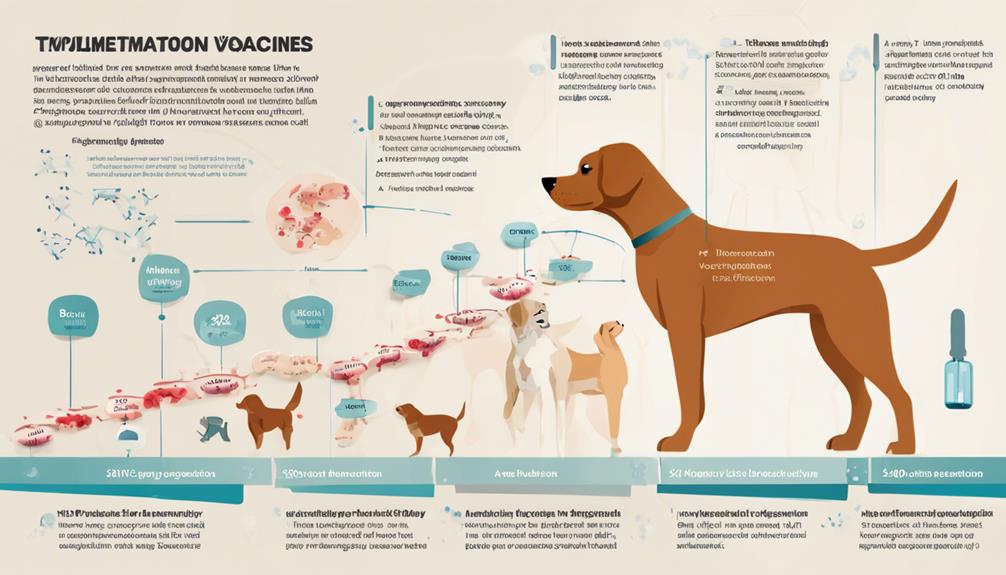7 Key Factors Determining Dog Vaccination Protection Period
To ensure your dog's vaccination protection period, consider these 7 key factors: 1) Vaccine type impacts duration and effectiveness, with some needing boosters. 2) Health status matters – a balanced diet and exercise boost immunity. 3) Age influences immune response, especially during puppy development. 4) Adhering to the vaccination schedule is vital for lasting immunity. 5) Environment and exposure risks affect protection efficacy. 6) Breed and genetics play a role in vaccine response. 7) Immune system response and antibody levels determine vaccine effectiveness. Understanding these factors aids in tailoring the best vaccination plan for your furry companion.
Vaccine Type
When selecting a dog vaccination for protection, consider the type of vaccine recommended by your veterinarian. Vaccines differ in their effectiveness, duration, and ability to provide immunity. Understanding these factors is crucial for maintaining your dog's health.
Vaccines work by stimulating the immune system to produce antibodies that protect against specific diseases. Some vaccines require booster shots to maintain immunity levels. Booster shots are additional doses of the vaccine given at specific intervals to 'boost' the immune response. The timing of booster shots is essential for sustaining protection.
The effectiveness of a vaccine is determined by its ability to provide immunity against a particular disease. Different vaccines have varying levels of effectiveness based on the type of pathogen they target. Your veterinarian will recommend vaccines that have proven to be highly effective in preventing common dog illnesses.
Duration of immunity refers to how long a vaccine can protect your dog against a specific disease. Some vaccines offer long-lasting immunity, while others may require more frequent administration to maintain protection. Understanding the duration of immunity of each vaccine is essential for creating an effective vaccination schedule for your dog.
Dog's Health Status
Considering your dog's health status is crucial when determining the appropriate vaccination schedule to ensure optimal protection against diseases. A dog's overall health, including dietary requirements and exercise regimen, plays a significant role in the effectiveness of vaccines. Here are some key points to keep in mind:
- Dietary Requirements: A balanced and nutritious diet is essential for maintaining a strong immune system. Adequate intake of vitamins, minerals, and proteins can help your dog's body respond better to vaccines.
- Exercise Regimen: Regular physical activity not only keeps your dog fit but also boosts their immune system. Exercise helps in improving circulation, which can aid in the distribution of vaccine components throughout the body.
- Weight Management: Maintaining a healthy weight is crucial for vaccine efficacy. Obesity can weaken the immune response, making vaccines less effective. Consult with your veterinarian to ensure your dog is at an optimal weight.
- Pre-existing Conditions: Dogs with underlying health issues may have a compromised immune system, affecting their ability to respond to vaccines. It's important to discuss any pre-existing conditions with your vet before administering vaccines.
- Veterinary Check-ups: Regular visits to the vet are essential to monitor your dog's overall health. These check-ups can help identify any health concerns that might impact vaccine effectiveness.
Age of the Dog
Assessing the age of your dog is crucial in determining the appropriate vaccination schedule to ensure optimal protection against diseases. The age of a dog plays a significant role in how their immune system responds to vaccinations.
Puppy development is a critical phase where the immune system is still immature. Puppies receive antibodies from their mother's milk, known as maternal antibodies, which protect them during the first weeks of life. However, these antibodies can interfere with vaccines, making it essential to follow a specific vaccination schedule to ensure the puppy develops its immunity effectively.
On the other end of the spectrum is senior immunity. As dogs age, their immune systems may weaken, affecting their response to vaccines. Older dogs may require additional booster shots or different vaccination protocols to maintain adequate immunity levels. Understanding the age-related changes in the immune system is crucial for tailoring the vaccination schedule to meet the specific needs of senior dogs.
Vaccination Schedule Adherence
To ensure maximum protection against diseases, adherence to the recommended vaccination schedule is crucial for your dog's health and immunity. Following the proper vaccination timeline is essential to ensure that your dog develops the necessary immunity levels to combat various infectious diseases effectively.
Here are some key points to consider regarding vaccination schedule adherence:
- Compliance challenges: Sticking to a vaccination schedule can be challenging due to various factors such as forgetfulness, financial constraints, or time constraints. Overcoming these challenges is vital to ensure your dog receives timely vaccinations.
- Vaccine effectiveness: Vaccines work best when administered at specific intervals to stimulate optimal immune responses. Deviating from the recommended schedule may compromise the effectiveness of the vaccines.
- Owner education: Understanding the importance of vaccinations and the significance of following the schedule is crucial. Educating yourself about the vaccines your dog needs and when they should be administered can help you stay on track.
- Herd immunity benefits: By vaccinating your dog on time, you not only protect your pet but also contribute to the overall herd immunity within the community. This helps prevent the spread of diseases among animals.
Ensuring strict adherence to the vaccination schedule is a proactive approach to safeguarding your dog's health and well-being.
Environment and Exposure Risks
Staying mindful of your dog's surroundings and potential exposure risks is pivotal in understanding the environmental factors that could impact their health and vaccination effectiveness. Outdoor activities and lifestyle risks play a significant role in determining the exposure of your dog to various diseases. Dogs engaging in activities like hiking, camping, or regular visits to dog parks are more likely to encounter pathogens, emphasizing the need for proper vaccination protocols.
Moreover, climate and geographical factors also influence the risks your dog may face. For instance, dogs living in regions with a high prevalence of ticks are at an increased risk of tick-borne diseases such as Lyme disease and ehrlichiosis. Similarly, dogs in areas prone to leptospirosis outbreaks need to be vaccinated adequately to prevent infection. Understanding the prevalent diseases in your region can help tailor your dog's vaccination schedule to provide optimal protection.
It is essential to consider your dog's environment when evaluating their vaccination needs. Factors like exposure to wildlife, contact with other dogs, and even urban versus rural settings can impact the risk of disease transmission. By assessing these environmental factors and potential exposure risks, you can work with your veterinarian to develop a vaccination plan that effectively safeguards your dog's health and well-being.
Breed and Genetics Influence
Understanding how breed and genetics influence your dog's response to vaccinations is crucial for tailoring an effective immunization strategy. Genetic predisposition plays a significant role in determining how well your dog responds to vaccines. Different breeds have specific factors that can impact their immune system's reaction to vaccines. Here are some key points to consider:
- Genetic Predisposition: Certain genetic traits can make some breeds more susceptible to vaccine reactions or less responsive to immunization. Understanding these predispositions can help veterinarians customize vaccination protocols for individual dogs.
- Breed Specific Factors: Each breed has unique characteristics that can influence how their immune system functions. Factors such as size, coat type, and overall health can all play a role in how a dog's body processes vaccines.
- Immune System Variability: Genetic diversity among dog breeds can lead to variations in immune system responses. Some breeds may have stronger immune systems that respond well to vaccines, while others may require different vaccination schedules or types.
- Hereditary Conditions: Inherited conditions can impact how a dog's body handles vaccines. Breeds prone to certain diseases may require extra precautions when administering vaccinations.
- Crossbreed Considerations: Crossbred dogs inherit genetic traits from multiple breeds, making it essential to understand how these factors interact when designing a vaccination plan.
Immune System Response

Genetic predispositions and breed-specific factors significantly influence how your dog's immune system responds to vaccinations. When a vaccine is administered, your dog's immune system recognizes the antigens present in the vaccine as foreign invaders. This recognition triggers a series of events leading to the production of antibodies specific to those antigens. The duration for which these antibodies remain at protective levels in your dog's system varies depending on factors such as genetics, breed, and overall health.
Antibody levels play a crucial role in determining the efficacy of a vaccine. After vaccination, the antibody levels rise, providing immunity against the specific disease targeted by the vaccine. However, these levels can decline over time, affecting the duration of protection offered by the vaccine. In some cases, certain breeds may have a genetic predisposition to mount a stronger immune response to vaccines, leading to higher and longer-lasting antibody levels.
Vaccine effectiveness is closely tied to the immune system's response. The duration for which a vaccine remains effective is influenced by factors such as the initial immune response, the type of vaccine administered, and the presence of any underlying health conditions. Understanding how your dog's immune system responds to vaccinations is crucial in determining the appropriate vaccination schedule to ensure optimal protection against preventable diseases.
Frequently Asked Questions
Can a Dog's Diet Affect the Duration of Vaccine Protection?
When considering the duration of vaccine protection in dogs, it's noteworthy that dietary supplements can impact this factor. A balanced diet rich in essential nutrients can strengthen the immune response post-vaccination, potentially prolonging the effectiveness of the vaccine.
How Does the Seasonality Impact Vaccine Effectiveness in Dogs?
Seasonality can influence vaccine effectiveness in dogs. Temperature fluctuations affect the immune response, potentially impacting antibody levels.
During extreme weather conditions, such as hot summers or cold winters, the body's ability to maintain optimal immune function may be compromised. This can lead to variations in vaccine protection levels.
Monitoring your dog's health and considering seasonal factors when scheduling vaccinations can help ensure continuous protection against diseases.
Do Certain Medications or Supplements Impact Vaccine Efficacy?
Certain medications may interact with vaccines, potentially impacting their efficacy. Supplement interference is also a consideration, as some supplements could affect how well a vaccine works in your dog.
Understanding these medication interactions and supplement interferences is crucial for ensuring your dog receives the full benefit of vaccinations. It's recommended to consult with your veterinarian to determine the best course of action when considering medications or supplements alongside vaccination protocols.
Can Stress and Anxiety Affect a Dog's Vaccine Immunity?
When it comes to your dog's vaccine immunity, stress and anxiety can indeed play a role. High stress levels can weaken the immune system, potentially impacting the effectiveness of vaccines.
Factors like exercise impact, sleep quality, environmental conditions, and social interaction also influence your pet's overall health and immune response.
Ensuring a balanced lifestyle for your dog, including adequate rest, proper exercise, and positive social interactions, can help maintain optimal vaccine protection.
Are There Alternative Vaccination Methods to Consider for Better Protection?
When considering alternative vaccination methods for better protection, needle-free vaccines and natural immunity boosters can be beneficial options.
Needle-free vaccines utilize technology to deliver antigens without traditional injections, reducing stress and discomfort for dogs.
Natural immunity boosters, such as probiotics or herbal supplements, can support the immune system and enhance vaccine efficacy.
These methods offer potential advantages in improving protection against diseases while considering the overall well-being of your pet.
Conclusion
In conclusion, the duration of dog vaccination protection is influenced by various key factors such as:
- Vaccine type
- The dog's health status
- Age
- Adherence to vaccination schedule
- Environmental exposure risks
- Breed genetics
- Immune system response
Understanding these factors is crucial in ensuring the effectiveness of vaccinations and maintaining the health and well-being of your canine companion.
By considering these factors, you can make informed decisions regarding your dog's vaccination needs and overall care.
